Unit 2 Exploring English Using language课件(共47张PPT)-外研版(2019)必修第一册
文档属性
| 名称 | Unit 2 Exploring English Using language课件(共47张PPT)-外研版(2019)必修第一册 |
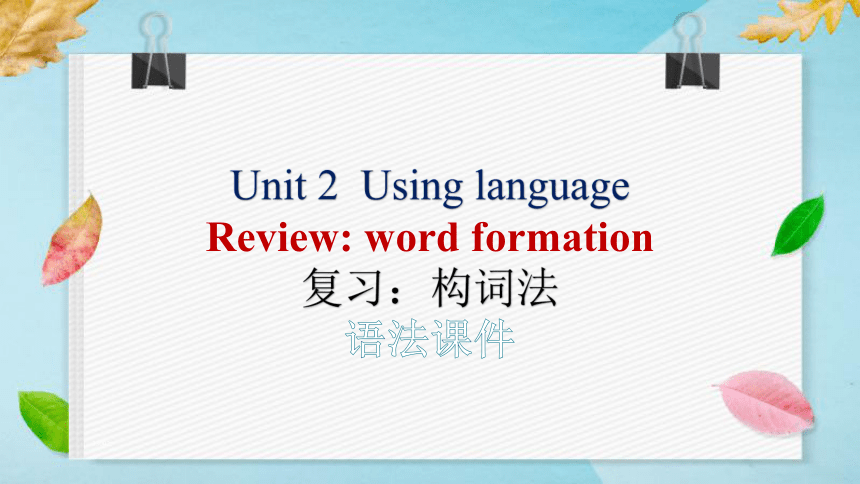
|
|
| 格式 | pptx | ||
| 文件大小 | 34.7MB | ||
| 资源类型 | 教案 | ||
| 版本资源 | 外研版(2019) | ||
| 科目 | 英语 | ||
| 更新时间 | 2025-07-28 00:00:00 | ||
图片预览

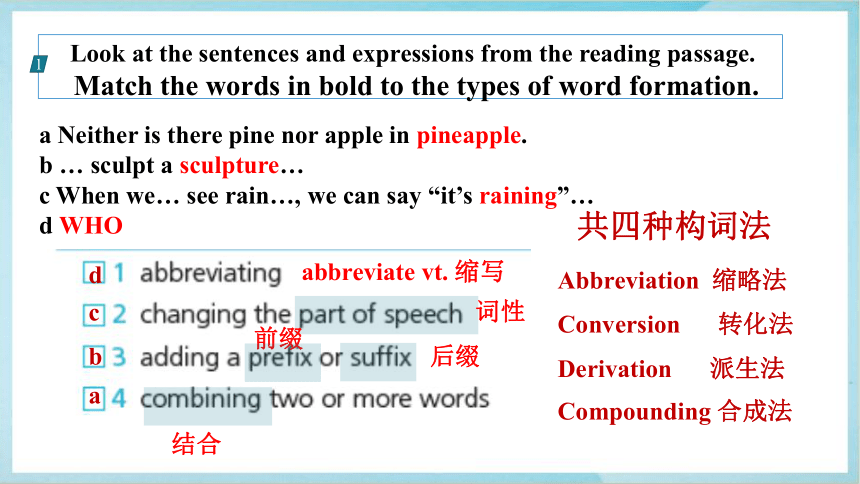
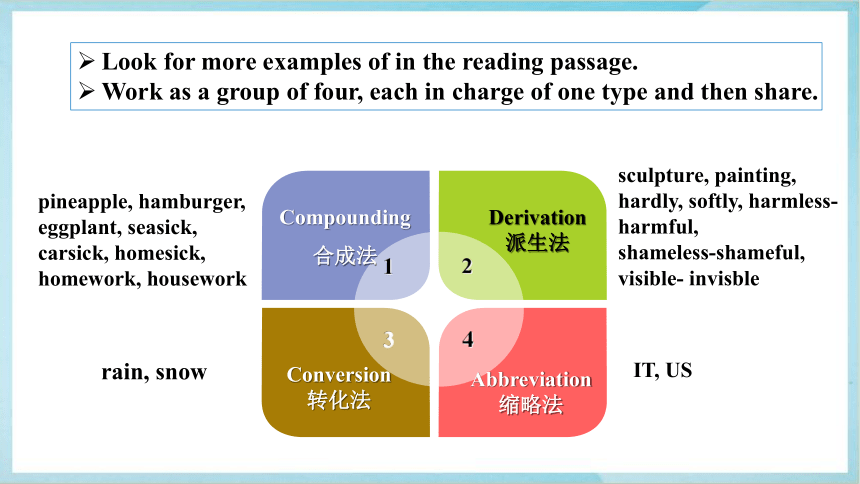
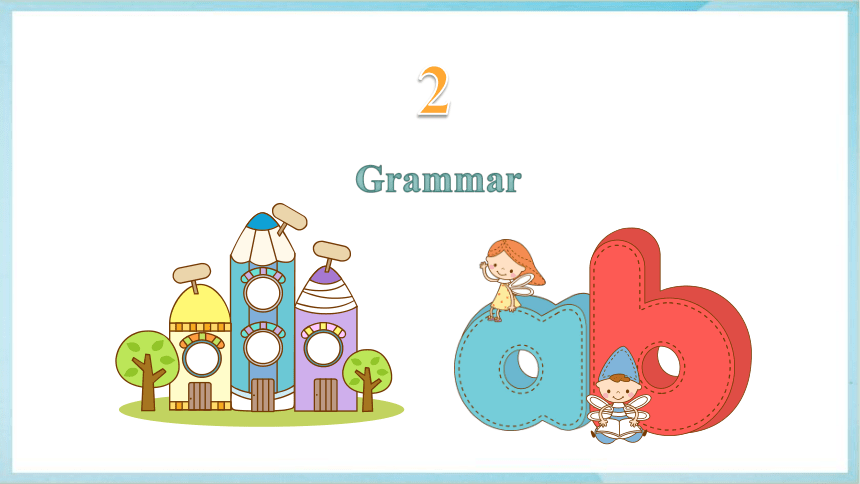
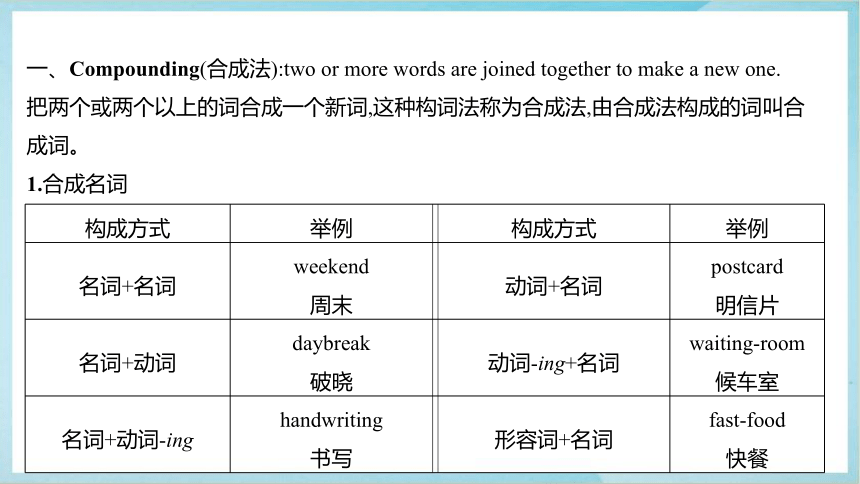
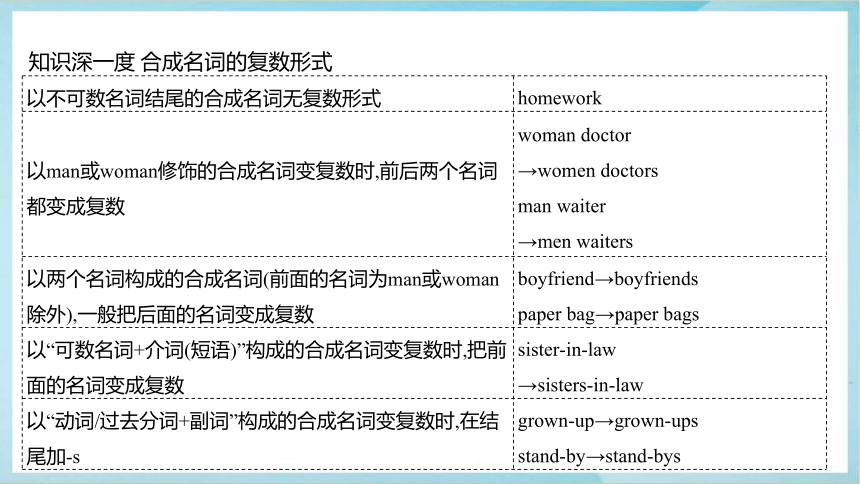
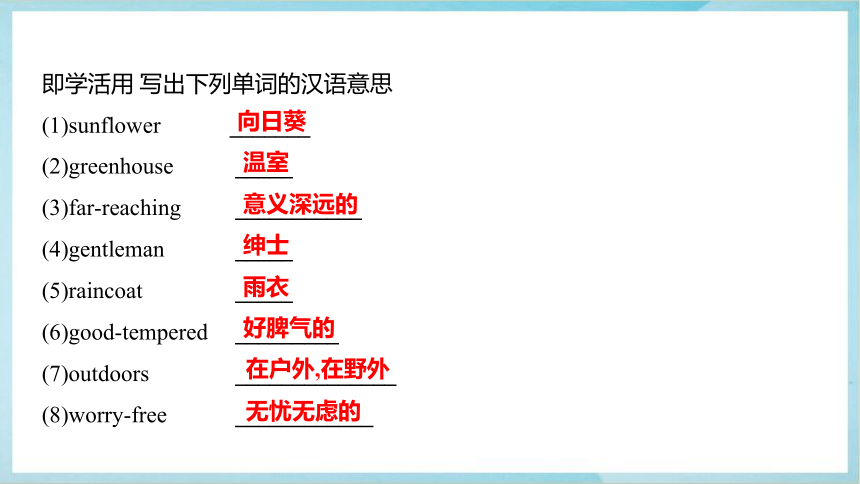
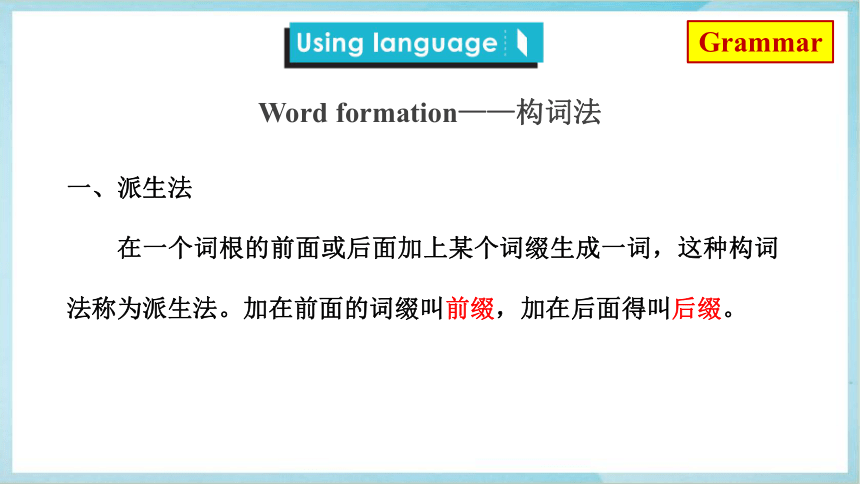
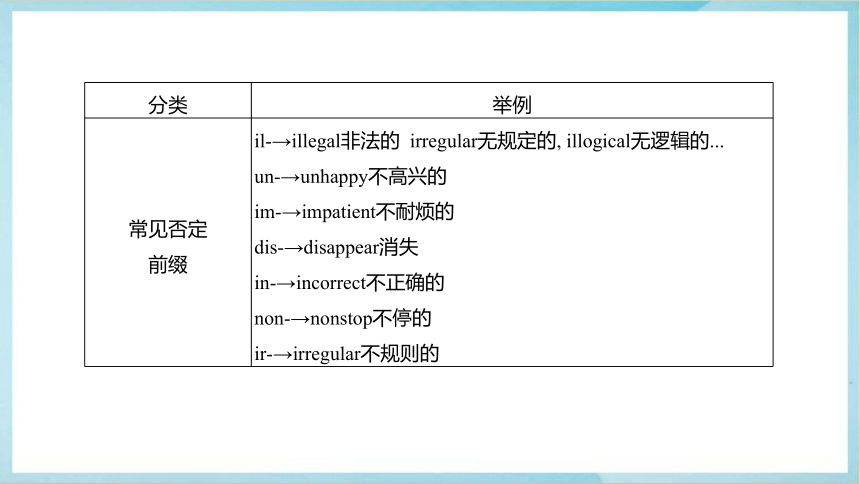
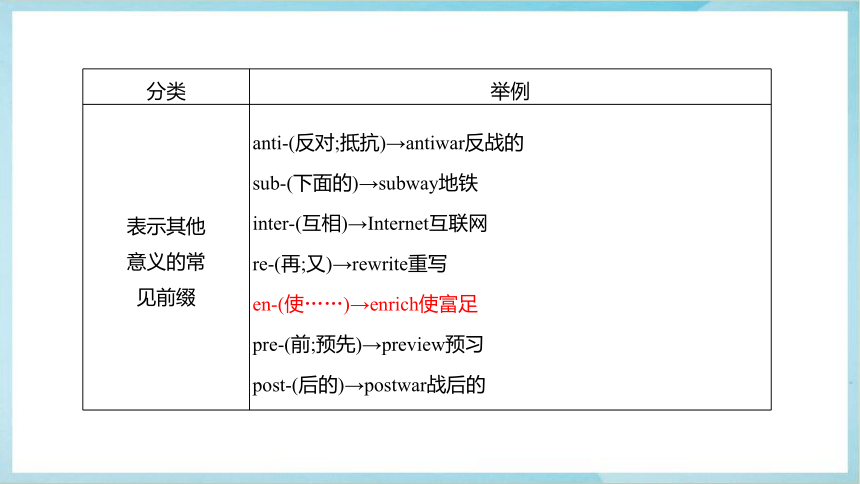
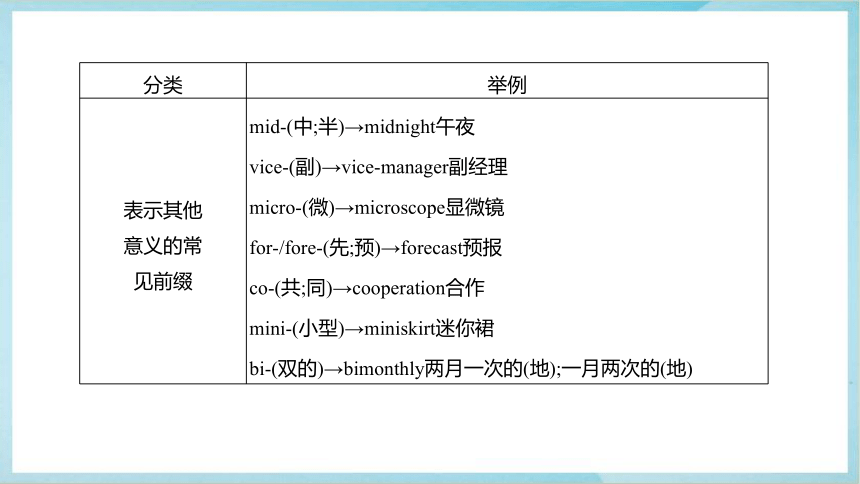
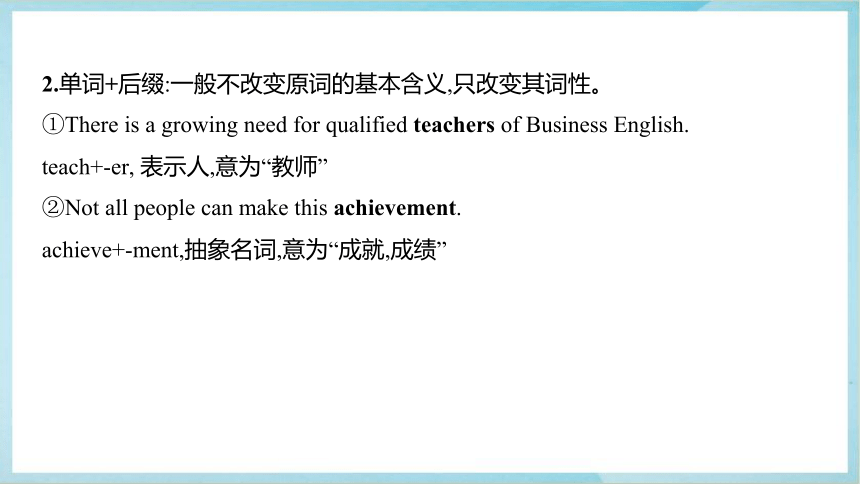
文档简介
(共47张PPT)
Unit 2 Using language
Review: word formation
复习:构词法
语法课件
a Neither is there pine nor apple in pineapple.
b … sculpt a sculpture…
c When we… see rain…, we can say “it’s raining”…
d WHO
abbreviate vt. 缩写
Look at the sentences and expressions from the reading passage.
Match the words in bold to the types of word formation.
前缀
后缀
词性
Abbreviation 缩略法
Conversion 转化法
Derivation 派生法
Compounding 合成法
结合
a
b
c
d
共四种构词法
1
Look for more examples of in the reading passage.
Work as a group of four, each in charge of one type and then share.
Compounding
合成法
Derivation派生法
Conversion 转化法
Abbreviation 缩略法
1
2
3
4
pineapple, hamburger, eggplant, seasick, carsick, homesick, homework, housework
sculpture, painting, hardly, softly, harmless- harmful,
shameless-shameful,
visible- invisble
rain, snow
IT, US
2
Grammar
一、Compounding(合成法):two or more words are joined together to make a new one.
把两个或两个以上的词合成一个新词,这种构词法称为合成法,由合成法构成的词叫合成词。
1.合成名词
构成方式 举例 构成方式 举例
名词+名词 weekend 周末 动词+名词 postcard
明信片
名词+动词 daybreak 破晓 动词-ing+名词 waiting-room
候车室
名词+动词-ing handwriting 书写 形容词+名词 fast-food
快餐
知识深一度 合成名词的复数形式
以不可数名词结尾的合成名词无复数形式 homework
以man或woman修饰的合成名词变复数时,前后两个名词都变成复数 woman doctor
→women doctors
man waiter
→men waiters
以两个名词构成的合成名词(前面的名词为man或woman除外),一般把后面的名词变成复数 boyfriend→boyfriends
paper bag→paper bags
以“可数名词+介词(短语)”构成的合成名词变复数时,把前面的名词变成复数 sister-in-law
→sisters-in-law
以“动词/过去分词+副词”构成的合成名词变复数时,在结尾加-s grown-up→grown-ups
stand-by→stand-bys
即学活用 写出下列单词的汉语意思
(1)sunflower _______
(2)greenhouse _____
(3)far-reaching ___________
(4)gentleman _____
(5)raincoat _____
(6)good-tempered _________
(7)outdoors ______________
(8)worry-free ____________
向日葵
温室
意义深远的
绅士
雨衣
好脾气的
在户外,在野外
无忧无虑的
一、派生法
在一个词根的前面或后面加上某个词缀生成一词,这种构词法称为派生法。加在前面的词缀叫前缀,加在后面得叫后缀。
Word formation——构词法
Grammar
分类 举例
常见否定 前缀 il-→illegal非法的 irregular无规定的, illogical无逻辑的...
un-→unhappy不高兴的
im-→impatient不耐烦的
dis-→disappear消失
in-→incorrect不正确的
non-→nonstop不停的
ir-→irregular不规则的
分类 举例
表示其他 意义的常 见前缀 anti-(反对;抵抗)→antiwar反战的
sub-(下面的)→subway地铁
inter-(互相)→Internet互联网
re-(再;又)→rewrite重写
en-(使……)→enrich使富足
pre-(前;预先)→preview预习
post-(后的)→postwar战后的
分类 举例
表示其他 意义的常 见前缀 mid-(中;半)→midnight午夜
vice-(副)→vice-manager副经理
micro-(微)→microscope显微镜
for-/fore-(先;预)→forecast预报
co-(共;同)→cooperation合作
mini-(小型)→miniskirt迷你裙
bi-(双的)→bimonthly两月一次的(地);一月两次的(地)
2.单词+后缀:一般不改变原词的基本含义,只改变其词性。
①There is a growing need for qualified teachers of Business English.
teach+-er, 表示人,意为“教师”
②Not all people can make this achievement.
achieve+-ment,抽象名词,意为“成就,成绩”
分类 列举 举例
常见 名词 后缀 -er/-or(从事……的人) -ese(某地人) -ess(女性) -ian(……的人) -ist(专业人员) -ism(主义) -ment(性质;状态) -ness(性质) -tion/-ation(动作;过程) -dom(状态;区域) teacher教师
Japanese日本人
actress女演员
musician音乐家
artist艺术家
liberalism自由主义
movement运动
darkness黑暗
invention发明
freedom自由
分类 列举 举例
常见 动词 后缀 -en(多用于形容词后) -fy(使……化) -ize(使……成为) widen加宽
beautify美化
realize意识到
常见 形容词 后缀 -al, -able, -an, -ful, -ive, -less, -like, -ly, -y, -ous, -some national民族的
reasonable合理的
American美国的
careful细心的
active有活力的
分类 列举 举例
常见 副词 后缀 -ly(用于形容词后表示方式或程度) -ward(s)(表示方向) quickly迅速地
angrily生气地
northward朝北
upward(s)向上
常见 数词 后缀 -teen, -th, -ty thirteen十三
fourth第四
fifty五十
即学活用 单句语法填空
(1)The teacher announced an ___________ (expected) result that everyone
couldn’t believe.
(2)I would like to visit Paris.It is one of the greatest tourist ___________ (attract)
in the world.
(3)After working for a whole day, Jane lay back ____________ (comfortable)
on the bed.
(4)Thanks very much for your _________(kind).
unexpected
attractions
comfortably
kindness
(5)When I help others, I have a strong _______ (feel) of satisfaction.
(6)When her son goes out, the mother is worried about her son’s _______ (safe).
(7)We often see some _________ (home) people in the street in some poor countries.
(8)Reading can not only _______ (rich) our knowledge but also _______ (wide)
our view.
feeling
safety
homeless
enrich
widen
三、Conversion(转化法):to create a new word without any change in spelling.
一个单词由一种词性转化为另一种或几种词性,这种构词法称为转化法。
1.动词转名词
①Let’s go out for a walk.我们到外面去散散步吧。
②He is a man of strong build.
他是一个体格健壮的男人。
2.名词转动词
①Did you book a seat on the plane
你订好飞机座位了吗
②Please hand me the book.请把那本书递给我。
3.形容词转动词
①We will try our best to better our living conditions.
我们要尽力改善我们的生活条件。
②You must slow down or you’ll make yourself ill.
你必须要放慢节奏,否则你会生病的。
即学活用 翻译下列句子,尤其注意黑体词的用法
(1)The company ships its goods all over the world.
_________________________
(2)The government has built new houses to house the homeless people.
_______________________________________
(3)These trees need to be watered.
___________________
(4)Tears of gratitude welled up in her eyes.
_____________________________
(5)Culture has furthered the advance of language.
______________________________
公司把货物运往世界各地。
政府建了新房子给无家可归的人提供住处。
这些树需要浇水了。
感激的泪水从她的眼里涌出来。
文化进一步促进了语言的发展。
(6)After I had pictured it over and over again in my mind, the big day finally arrived.
____________________________________________________
知识宽一度
有些单词的词性转化后,词的发音发生了变化。例如:
present / preznt/ n.礼物,现在;adj.当前的,在场的,出席的→/pr zent/ v.赠送,表达
permit /p m t/v.准许→/ p m t/ n.许可证
record / rek d/ n.唱片,记录→/r k d/ v.做记录
我在脑海中进行了无数次的想象之后,这一天终于到来了。
Word formation——构词法
四、缩略法
是指把两个或两个以上的词各取一部分(或用单词首尾字母或用截头取尾的方法)合在一起构成一个新单词。读音主要有两种形式,即各字母分别读音或作为一个单词来读。
very important person→VIP(读字母音)要人,贵宾
television→TV(读字母音)电视
advertisement→ad广告
laboratory→lab实验室
Grammar
即学活用 写出下列词汇的缩略词及意思
(1)Voice of America→______ _________
(2)National Aeronautics and Space Administration
→_______ ___________________
(3)World Trade Organization
→______ _____________
(4)United Nations Educational,Scientific and
Cultural Organization
→__________ __________________
VOA
美国之音
NASA
美国国家航空航天局
WTO
世界贸易组织
UNESCO
联合国教科文组织
(5)Chief Executive Officer
→______ ___________
(6)Intensive Care Unit
→_____ _____________
(7)Electronic Toll Collection
→______ _________
(8)Most Valuable Player
→______ ______________
CEO
首席执行官
ICU
重症监护病房
ETC
电子收费
MVP
最有价值球员
3
Application
Complete the passage with the help of word formation.
When you open a dictionary, you often come across a lot of unfamiliar words. You might think this is a bit scary. But many of them are formed using other simpler words. This is called word formation.
Words formed by combining other words are called compounds, for example, ____________ (a friend that you contact by writing, traditionally using a pen) and _____________ (known by many people).
Prefixes and suffixes often have fixed meanings. If you add un- or in- to a word, the new word usually means the opposite. For example, if something isn’t correct it’s __________, and if someone isn’t happy they are _________. Words with the suffixes -ment and -ness are often nouns. For example, if somebody has improved a lot, they have made great ________________.
penfriend
well-known
incorrect
unhappy
improvement
2
偶然碰到
恐怖的
形成
Some nouns and adjectives can be used as verbs, or the other way round. When we calm somebody down, they become ______. And we can give someone a present by__________ it.
And sometimes a word is made up of the first letters of several words: “World Trade Organization ” can be referred to as _____ , and _______ is short for “as soon as possible”.
It is impossible to know the meaning of every word, but knowing about word formation can help us guess their meanings.
calm
presenting
WTO
ASAP
Complete the passage with the help of word formation.
2
calm down冷静
be made up of由...组成
be referred to as 被称作...
被用作...
反之亦然
5
AmE. vs. BrE
Enjoy a funny video about British English and American English.
Look at the pictures and get to know the American English words and their British equivalents.(P23)
What differences can you find
4
Look at the pictures and get to know the American English words and their British equivalents. (P23)
American English
British English
subway
highway
theater
gas
apartment
elevator
underground
motorway
theatre
petrol
flat
lift
4
Today, American English is in common international use. It is different from British English in several ways, mostly in spelling and vocabulary. Some American spellings were created by Noah Webster, who made one of America's first dictionaries. He changed “-re” spellings to “er”, which is why 1_______ is spelt 2________ in American English.
The Americans and the British also use different words for everyday things. For example, Americans talk about putting 3____ in their cars and driving along the 4________ whereas in the UK, people put 5______ in their cars and drive along the 6__________.
Now Complete the passage with the words above. (P24)
subway/underground highway/motorway theater/theatre gas/petrol apartment/flat elevator/lift
theatre
theater
gas
highway
petrol
motorway
in ... ways
Americans take the7________ to the top floor of a building, but the British use the 8_____. In the US, they take the 9_______, but in the UK, people travel on the 10____________. Americans live in a(n) 11__________, while the British live in a(n) 12_____.
It's not as confusing as it seems: usually people from the two countries can understand each other from the context. But that doesn't stop them having a friendly argument about which word is the “right” one!
subway/underground highway/motorway theater/theatre gas/petrol apartment/flat elevator/lift
elevator
lift
subway
underground
apartment
flat
as... as...
Work in pairs. Find more examples of differences between American and British English. Use a dictionary or search on the Internet. (P24)
Spelling
Vocabulary
Pronunciation
5
6
Unfamiliar English expressions
Before listening
Can you guess the meaning of these
words
selfie
netizen
BRB
COZ
G2G
selfie= self+ie:
a photograph that you take of yourself, usually with a mobile phone
netizen=net+izen
citizen=city+izen
a person who uses the Internet
BRB — be right back
COZ — because /b k z/
G2G — got to go
two=2
7
Listening & examples
Listen to three conversations and match them to the pictures.(P25)
□ Learning to learn
Some of the language used on the Internet is different to the language used in other forms of communication. It may be a quick and, to you, clear way to communicate, but before you use it, stop and think: who do you want to communicate with and why Make sure that any abbreviations(缩写) and emojis(表情符号) you use are appropriate for the situation, and consider whether your readers will even know what you mean by BRB or COZ.
a
b
c
a: ______________
b: ______________
c: ______________
Conversation 3
Conversation 1
Conversation 2
6
Listen again and complete the table. (P25)
Words Meaning Origin
dim sum a kind of traditional 1____________ from 2_______
________________
3_______ using a cellphone without caring about others a combination of the words 4__________ and 5_______
6_______ a shorter way of saying 7______________ from the Internet
Chinese food
the
Guangdong dialect
cellfish
cellphone
selfish
LOL
“laugh out loud”
7
How do the speakers ask for and explain the meanings of the words
Presenter: Conversation 1
A: I’m going to buy something to eat from the restaurant
downstairs. Would you like anything
B: Oh yes, please. Could you order me some dim sum
A: Some what
B: Dim sum.
A: What kind of food is that
B: It’s a kind of traditional Chinese food from South China, including dumplings,
spring rolls, meatballs and so on.
A: Oh, I see. So “dim sum” comes from Chinese
B: Yes, that’s right. In fact, it comes from the Guangdong dialect. In Mandarin or
Putonghua it would be “dian xin”.
A: Well, it sounds good! Maybe I’ll order that as well ...
How do the speakers ask for and explain the meanings of the words
Presenter: Conversation 2
A: How was the movie
B: It was great, but someone in front of me was talking so loudly on her phone.
A: How cellfish!
B: Yes, I agree. Very selfish.
A: Ah, do you know what I mean by “cellish”
B: Of course! When you say “selfish”, you mean only caring about yourself and
not about other people, right
A: That’s what “selfish” with an “s” means, but I’m talking about “cellfish”.
starting with the letter “c”.
B: I haven’t heard that word before. What does it mean
A: It means using a cellphone in a way that shows you don’t care about the other
people around you.
B: That’s interesting. How do you spell it
A: C-E-L-L-F-I-S-H. It’s the words “cellphone and “selfish” put together.
B: Oh, I see..
专指在任何场合任何地点把手机打个不停的人。
Presenter: Conversation 3
[SFX of someone pressing mobile phone keys, followved by a chime indicating a new message]
A: Darling, could you take a look at this message from Lucy I have no idea
what she’s talking about... again.
B: What has she said
A: Well, I told her a joke that Bob told me today at the office,
and, as you see, she replied “LOL”. What’s that for
B: Oh, LOL! It’s a shorter way of saying “laugh out loud”.
A: I’ve never seen or heard that before. Where does it come from
B: It was first used on the Internet. You use it to show you think something is
very funny.
A: Oh, okay.
B: Keep up with the times, darling!
How do the speakers ask for and explain the meanings of the words
How do the speakers ask for and explain the meanings of the words
Useful expressions:
· What kind of food is that
It's a kind of…
· Do you know what I mean by…
It means…
· What's that for
It's…
· Where does it come from
It was first used…
Listen again if necessary.
Situation 1:
You are a waiter / waitress in a restaurant. You ask your customer whether he / she needs a doogy bag.
(Notes: A “doggy bag” is a bag or box in which you
take unfinished food home from a restaurant.)
Situation 2:
You see a sign in a supermarket saying “3 for 2”.
You don't know what it means and ask the shop assistant to explain.
Act out the conversation to ask for and explain the meanings of the expressions.
A
□ Useful expressions
Situation 1
· It means…
· You use it to…
Situation 2
· I beg your pardon
· What does … mean
· What's that for
· When you say … you mean …, right
THX:
NVM:
IMO:
CUL:
BTW:
Thanks 谢谢
For reference
BBL:
VG:
JK:
By the way 顺便说一下
See you later 下次再会
In my opinion 依我所见
Very good 很好
Never mind 别担心
Be back later 稍后回来
Just kidding 开个玩笑
1.Find new words and their meanings on the Internet.
2.Make up similar conversation.
3.Review the words and expressions you learned today.
Homework
Unit 2 Using language
Review: word formation
复习:构词法
语法课件
a Neither is there pine nor apple in pineapple.
b … sculpt a sculpture…
c When we… see rain…, we can say “it’s raining”…
d WHO
abbreviate vt. 缩写
Look at the sentences and expressions from the reading passage.
Match the words in bold to the types of word formation.
前缀
后缀
词性
Abbreviation 缩略法
Conversion 转化法
Derivation 派生法
Compounding 合成法
结合
a
b
c
d
共四种构词法
1
Look for more examples of in the reading passage.
Work as a group of four, each in charge of one type and then share.
Compounding
合成法
Derivation派生法
Conversion 转化法
Abbreviation 缩略法
1
2
3
4
pineapple, hamburger, eggplant, seasick, carsick, homesick, homework, housework
sculpture, painting, hardly, softly, harmless- harmful,
shameless-shameful,
visible- invisble
rain, snow
IT, US
2
Grammar
一、Compounding(合成法):two or more words are joined together to make a new one.
把两个或两个以上的词合成一个新词,这种构词法称为合成法,由合成法构成的词叫合成词。
1.合成名词
构成方式 举例 构成方式 举例
名词+名词 weekend 周末 动词+名词 postcard
明信片
名词+动词 daybreak 破晓 动词-ing+名词 waiting-room
候车室
名词+动词-ing handwriting 书写 形容词+名词 fast-food
快餐
知识深一度 合成名词的复数形式
以不可数名词结尾的合成名词无复数形式 homework
以man或woman修饰的合成名词变复数时,前后两个名词都变成复数 woman doctor
→women doctors
man waiter
→men waiters
以两个名词构成的合成名词(前面的名词为man或woman除外),一般把后面的名词变成复数 boyfriend→boyfriends
paper bag→paper bags
以“可数名词+介词(短语)”构成的合成名词变复数时,把前面的名词变成复数 sister-in-law
→sisters-in-law
以“动词/过去分词+副词”构成的合成名词变复数时,在结尾加-s grown-up→grown-ups
stand-by→stand-bys
即学活用 写出下列单词的汉语意思
(1)sunflower _______
(2)greenhouse _____
(3)far-reaching ___________
(4)gentleman _____
(5)raincoat _____
(6)good-tempered _________
(7)outdoors ______________
(8)worry-free ____________
向日葵
温室
意义深远的
绅士
雨衣
好脾气的
在户外,在野外
无忧无虑的
一、派生法
在一个词根的前面或后面加上某个词缀生成一词,这种构词法称为派生法。加在前面的词缀叫前缀,加在后面得叫后缀。
Word formation——构词法
Grammar
分类 举例
常见否定 前缀 il-→illegal非法的 irregular无规定的, illogical无逻辑的...
un-→unhappy不高兴的
im-→impatient不耐烦的
dis-→disappear消失
in-→incorrect不正确的
non-→nonstop不停的
ir-→irregular不规则的
分类 举例
表示其他 意义的常 见前缀 anti-(反对;抵抗)→antiwar反战的
sub-(下面的)→subway地铁
inter-(互相)→Internet互联网
re-(再;又)→rewrite重写
en-(使……)→enrich使富足
pre-(前;预先)→preview预习
post-(后的)→postwar战后的
分类 举例
表示其他 意义的常 见前缀 mid-(中;半)→midnight午夜
vice-(副)→vice-manager副经理
micro-(微)→microscope显微镜
for-/fore-(先;预)→forecast预报
co-(共;同)→cooperation合作
mini-(小型)→miniskirt迷你裙
bi-(双的)→bimonthly两月一次的(地);一月两次的(地)
2.单词+后缀:一般不改变原词的基本含义,只改变其词性。
①There is a growing need for qualified teachers of Business English.
teach+-er, 表示人,意为“教师”
②Not all people can make this achievement.
achieve+-ment,抽象名词,意为“成就,成绩”
分类 列举 举例
常见 名词 后缀 -er/-or(从事……的人) -ese(某地人) -ess(女性) -ian(……的人) -ist(专业人员) -ism(主义) -ment(性质;状态) -ness(性质) -tion/-ation(动作;过程) -dom(状态;区域) teacher教师
Japanese日本人
actress女演员
musician音乐家
artist艺术家
liberalism自由主义
movement运动
darkness黑暗
invention发明
freedom自由
分类 列举 举例
常见 动词 后缀 -en(多用于形容词后) -fy(使……化) -ize(使……成为) widen加宽
beautify美化
realize意识到
常见 形容词 后缀 -al, -able, -an, -ful, -ive, -less, -like, -ly, -y, -ous, -some national民族的
reasonable合理的
American美国的
careful细心的
active有活力的
分类 列举 举例
常见 副词 后缀 -ly(用于形容词后表示方式或程度) -ward(s)(表示方向) quickly迅速地
angrily生气地
northward朝北
upward(s)向上
常见 数词 后缀 -teen, -th, -ty thirteen十三
fourth第四
fifty五十
即学活用 单句语法填空
(1)The teacher announced an ___________ (expected) result that everyone
couldn’t believe.
(2)I would like to visit Paris.It is one of the greatest tourist ___________ (attract)
in the world.
(3)After working for a whole day, Jane lay back ____________ (comfortable)
on the bed.
(4)Thanks very much for your _________(kind).
unexpected
attractions
comfortably
kindness
(5)When I help others, I have a strong _______ (feel) of satisfaction.
(6)When her son goes out, the mother is worried about her son’s _______ (safe).
(7)We often see some _________ (home) people in the street in some poor countries.
(8)Reading can not only _______ (rich) our knowledge but also _______ (wide)
our view.
feeling
safety
homeless
enrich
widen
三、Conversion(转化法):to create a new word without any change in spelling.
一个单词由一种词性转化为另一种或几种词性,这种构词法称为转化法。
1.动词转名词
①Let’s go out for a walk.我们到外面去散散步吧。
②He is a man of strong build.
他是一个体格健壮的男人。
2.名词转动词
①Did you book a seat on the plane
你订好飞机座位了吗
②Please hand me the book.请把那本书递给我。
3.形容词转动词
①We will try our best to better our living conditions.
我们要尽力改善我们的生活条件。
②You must slow down or you’ll make yourself ill.
你必须要放慢节奏,否则你会生病的。
即学活用 翻译下列句子,尤其注意黑体词的用法
(1)The company ships its goods all over the world.
_________________________
(2)The government has built new houses to house the homeless people.
_______________________________________
(3)These trees need to be watered.
___________________
(4)Tears of gratitude welled up in her eyes.
_____________________________
(5)Culture has furthered the advance of language.
______________________________
公司把货物运往世界各地。
政府建了新房子给无家可归的人提供住处。
这些树需要浇水了。
感激的泪水从她的眼里涌出来。
文化进一步促进了语言的发展。
(6)After I had pictured it over and over again in my mind, the big day finally arrived.
____________________________________________________
知识宽一度
有些单词的词性转化后,词的发音发生了变化。例如:
present / preznt/ n.礼物,现在;adj.当前的,在场的,出席的→/pr zent/ v.赠送,表达
permit /p m t/v.准许→/ p m t/ n.许可证
record / rek d/ n.唱片,记录→/r k d/ v.做记录
我在脑海中进行了无数次的想象之后,这一天终于到来了。
Word formation——构词法
四、缩略法
是指把两个或两个以上的词各取一部分(或用单词首尾字母或用截头取尾的方法)合在一起构成一个新单词。读音主要有两种形式,即各字母分别读音或作为一个单词来读。
very important person→VIP(读字母音)要人,贵宾
television→TV(读字母音)电视
advertisement→ad广告
laboratory→lab实验室
Grammar
即学活用 写出下列词汇的缩略词及意思
(1)Voice of America→______ _________
(2)National Aeronautics and Space Administration
→_______ ___________________
(3)World Trade Organization
→______ _____________
(4)United Nations Educational,Scientific and
Cultural Organization
→__________ __________________
VOA
美国之音
NASA
美国国家航空航天局
WTO
世界贸易组织
UNESCO
联合国教科文组织
(5)Chief Executive Officer
→______ ___________
(6)Intensive Care Unit
→_____ _____________
(7)Electronic Toll Collection
→______ _________
(8)Most Valuable Player
→______ ______________
CEO
首席执行官
ICU
重症监护病房
ETC
电子收费
MVP
最有价值球员
3
Application
Complete the passage with the help of word formation.
When you open a dictionary, you often come across a lot of unfamiliar words. You might think this is a bit scary. But many of them are formed using other simpler words. This is called word formation.
Words formed by combining other words are called compounds, for example, ____________ (a friend that you contact by writing, traditionally using a pen) and _____________ (known by many people).
Prefixes and suffixes often have fixed meanings. If you add un- or in- to a word, the new word usually means the opposite. For example, if something isn’t correct it’s __________, and if someone isn’t happy they are _________. Words with the suffixes -ment and -ness are often nouns. For example, if somebody has improved a lot, they have made great ________________.
penfriend
well-known
incorrect
unhappy
improvement
2
偶然碰到
恐怖的
形成
Some nouns and adjectives can be used as verbs, or the other way round. When we calm somebody down, they become ______. And we can give someone a present by__________ it.
And sometimes a word is made up of the first letters of several words: “World Trade Organization ” can be referred to as _____ , and _______ is short for “as soon as possible”.
It is impossible to know the meaning of every word, but knowing about word formation can help us guess their meanings.
calm
presenting
WTO
ASAP
Complete the passage with the help of word formation.
2
calm down冷静
be made up of由...组成
be referred to as 被称作...
被用作...
反之亦然
5
AmE. vs. BrE
Enjoy a funny video about British English and American English.
Look at the pictures and get to know the American English words and their British equivalents.(P23)
What differences can you find
4
Look at the pictures and get to know the American English words and their British equivalents. (P23)
American English
British English
subway
highway
theater
gas
apartment
elevator
underground
motorway
theatre
petrol
flat
lift
4
Today, American English is in common international use. It is different from British English in several ways, mostly in spelling and vocabulary. Some American spellings were created by Noah Webster, who made one of America's first dictionaries. He changed “-re” spellings to “er”, which is why 1_______ is spelt 2________ in American English.
The Americans and the British also use different words for everyday things. For example, Americans talk about putting 3____ in their cars and driving along the 4________ whereas in the UK, people put 5______ in their cars and drive along the 6__________.
Now Complete the passage with the words above. (P24)
subway/underground highway/motorway theater/theatre gas/petrol apartment/flat elevator/lift
theatre
theater
gas
highway
petrol
motorway
in ... ways
Americans take the7________ to the top floor of a building, but the British use the 8_____. In the US, they take the 9_______, but in the UK, people travel on the 10____________. Americans live in a(n) 11__________, while the British live in a(n) 12_____.
It's not as confusing as it seems: usually people from the two countries can understand each other from the context. But that doesn't stop them having a friendly argument about which word is the “right” one!
subway/underground highway/motorway theater/theatre gas/petrol apartment/flat elevator/lift
elevator
lift
subway
underground
apartment
flat
as... as...
Work in pairs. Find more examples of differences between American and British English. Use a dictionary or search on the Internet. (P24)
Spelling
Vocabulary
Pronunciation
5
6
Unfamiliar English expressions
Before listening
Can you guess the meaning of these
words
selfie
netizen
BRB
COZ
G2G
selfie= self+ie:
a photograph that you take of yourself, usually with a mobile phone
netizen=net+izen
citizen=city+izen
a person who uses the Internet
BRB — be right back
COZ — because /b k z/
G2G — got to go
two=2
7
Listening & examples
Listen to three conversations and match them to the pictures.(P25)
□ Learning to learn
Some of the language used on the Internet is different to the language used in other forms of communication. It may be a quick and, to you, clear way to communicate, but before you use it, stop and think: who do you want to communicate with and why Make sure that any abbreviations(缩写) and emojis(表情符号) you use are appropriate for the situation, and consider whether your readers will even know what you mean by BRB or COZ.
a
b
c
a: ______________
b: ______________
c: ______________
Conversation 3
Conversation 1
Conversation 2
6
Listen again and complete the table. (P25)
Words Meaning Origin
dim sum a kind of traditional 1____________ from 2_______
________________
3_______ using a cellphone without caring about others a combination of the words 4__________ and 5_______
6_______ a shorter way of saying 7______________ from the Internet
Chinese food
the
Guangdong dialect
cellfish
cellphone
selfish
LOL
“laugh out loud”
7
How do the speakers ask for and explain the meanings of the words
Presenter: Conversation 1
A: I’m going to buy something to eat from the restaurant
downstairs. Would you like anything
B: Oh yes, please. Could you order me some dim sum
A: Some what
B: Dim sum.
A: What kind of food is that
B: It’s a kind of traditional Chinese food from South China, including dumplings,
spring rolls, meatballs and so on.
A: Oh, I see. So “dim sum” comes from Chinese
B: Yes, that’s right. In fact, it comes from the Guangdong dialect. In Mandarin or
Putonghua it would be “dian xin”.
A: Well, it sounds good! Maybe I’ll order that as well ...
How do the speakers ask for and explain the meanings of the words
Presenter: Conversation 2
A: How was the movie
B: It was great, but someone in front of me was talking so loudly on her phone.
A: How cellfish!
B: Yes, I agree. Very selfish.
A: Ah, do you know what I mean by “cellish”
B: Of course! When you say “selfish”, you mean only caring about yourself and
not about other people, right
A: That’s what “selfish” with an “s” means, but I’m talking about “cellfish”.
starting with the letter “c”.
B: I haven’t heard that word before. What does it mean
A: It means using a cellphone in a way that shows you don’t care about the other
people around you.
B: That’s interesting. How do you spell it
A: C-E-L-L-F-I-S-H. It’s the words “cellphone and “selfish” put together.
B: Oh, I see..
专指在任何场合任何地点把手机打个不停的人。
Presenter: Conversation 3
[SFX of someone pressing mobile phone keys, followved by a chime indicating a new message]
A: Darling, could you take a look at this message from Lucy I have no idea
what she’s talking about... again.
B: What has she said
A: Well, I told her a joke that Bob told me today at the office,
and, as you see, she replied “LOL”. What’s that for
B: Oh, LOL! It’s a shorter way of saying “laugh out loud”.
A: I’ve never seen or heard that before. Where does it come from
B: It was first used on the Internet. You use it to show you think something is
very funny.
A: Oh, okay.
B: Keep up with the times, darling!
How do the speakers ask for and explain the meanings of the words
How do the speakers ask for and explain the meanings of the words
Useful expressions:
· What kind of food is that
It's a kind of…
· Do you know what I mean by…
It means…
· What's that for
It's…
· Where does it come from
It was first used…
Listen again if necessary.
Situation 1:
You are a waiter / waitress in a restaurant. You ask your customer whether he / she needs a doogy bag.
(Notes: A “doggy bag” is a bag or box in which you
take unfinished food home from a restaurant.)
Situation 2:
You see a sign in a supermarket saying “3 for 2”.
You don't know what it means and ask the shop assistant to explain.
Act out the conversation to ask for and explain the meanings of the expressions.
A
□ Useful expressions
Situation 1
· It means…
· You use it to…
Situation 2
· I beg your pardon
· What does … mean
· What's that for
· When you say … you mean …, right
THX:
NVM:
IMO:
CUL:
BTW:
Thanks 谢谢
For reference
BBL:
VG:
JK:
By the way 顺便说一下
See you later 下次再会
In my opinion 依我所见
Very good 很好
Never mind 别担心
Be back later 稍后回来
Just kidding 开个玩笑
1.Find new words and their meanings on the Internet.
2.Make up similar conversation.
3.Review the words and expressions you learned today.
Homework
